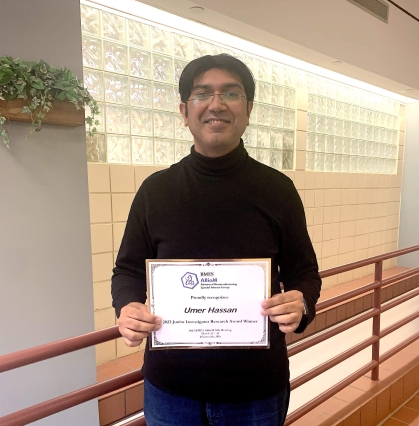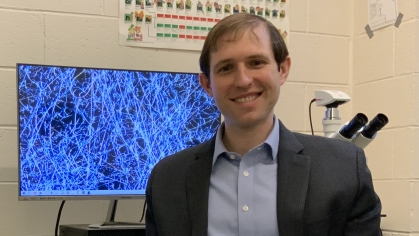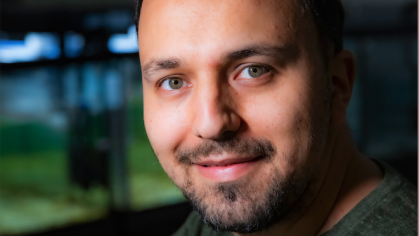ECE Professor Receives BMES Advanced Biomanufacturing 2023 Junior Investigator Award

At its March meeting, the Biomedical Engineering Society (BMES) Advanced Biomanufacturing special interest group (ABioM SIG) presented Department of Electrical and Computer Engineering assistant professor Umer Hassan with a 2023 ABioM Junior Investigator Research Award. The award recognizes Hassan’s contributions to and career success in the field of advanced biomanufacturing.
“I’m very excited to receive this award as it’s a testament to my research contributions to the field and highlights the translational impact of the biomedical technologies being developed by my research group,” Hassan says, whose research interests include disease diagnostics, immuno-engineering, and personalized medicine. He shares credit for his success with his hardworking and dedicated students.
A Smartphone Enabled Portable Microscope
At the ABioM SIG meeting, Hassan spoke about his lab’s development of a miniaturized, automated 3D-printed portable microscope enabled by smartphones. “It can image any labelled cells at high resolution and perform cellular enumerations in a completely automated way, within seconds,” Hassan explains.
This project is funded in part, according to Hassan, by National Science Foundation (NSF) and New Jersey Health Foundation (NJHF) grants. He has also received start-up funding from the ECE department and the Rutgers Global Health Institute.
While Hassan’s team initially developed its 3D-printed portable fluorescence microscopy system to enumerate immune infectious disease cells for patient stratification, he reports that lately other opportunities for the technology are being explored to broaden future market reach.
“We have found a great fit in biomanufacturing,” he reports. “Most biomanufacturing applications require the setup to be efficiently integrated into the manufacturing workflows. Considering our system’s portability, it has the potential to be a good fit for biomanufacturing applications.”
A Bright Future
Since 2018, Hassan’s Laboratory of Immuno-engineering and Micro-nano technologies for Personalized Healthcare (LIMPH) has focused on developing next generation biomedical technologies for rapid translation to the public.
According to him, the new portable microscopy system, with applications in both biomanufacturing as well as infectious disease monitoring, aligns with LIMPH’s mission. The new system also has educational value, as a simplified setup could be used for high school and undergraduate science experiments.
The future looks bright for the new technology, as Hassan says he is in the process of filing an invention disclosure with Rutgers Innovation Ventures to protect its intellectual property. “This will be central for the successful translation and prospective commercialization of our technology,” he says.


